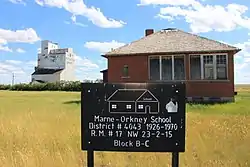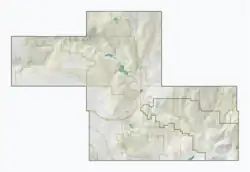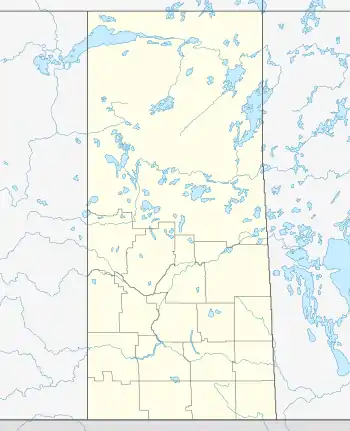Orkney | |
|---|---|
Unorganized hamlet | |
 Orkney School and ex. Patterson elevator in background. | |
 Orkney  Orkney | |
| Coordinates: 49°08′00″N 107°55′02″W / 49.1333°N 107.9172°W | |
| Country | Canada |
| Province | Saskatchewan |
| Region | Southwest Saskatchewan |
| Rural municipality | Val Marie No. 17 |
| Government | |
| • Governing body | Rural Municipality of Val Marie No. 17 |
| • MLA | Dave Marit |
| • MP | Jeremy Patzer |
| Area | |
| • Total | 0.23 km2 (0.09 sq mi) |
| Population (2011) | |
| • Total | 4 |
| Time zone | CST |
| Postal code | S0N 1V0 |
| Area code | 306 |
| Highways | Highway 18 |
Orkney is an unincorporated community within the Rural Municipality of Val Marie No. 17, Saskatchewan, Canada. Founded in 1924 when the Canadian Pacific Railway constructed its branch line to Val Marie, it was incorporated as a village in June 1928. Orkney is ten miles from the Canada–United States border.[1] Listed as a designated place by Statistics Canada, the hamlet had a population of four in the Canada 2011 Census.[2]
Etymology
Orkney was named after Orkney, Scotland, the boyhood home of local MP George Spence.[1]
History
Like the vast majority of Saskatchewan villages, Orkney was constructed as a planned railway townsite. Before construction, the area was served by the one-room school and rural post office at Diebolt. The village was founded when the CPR ran through the area in 1924. For the first year, buildings were erected randomly, as the townsite was only formally surveyed in 1925. In its heyday, the community had two grocery stores, a hotel, hardware store, pharmacy, barbershop, butcher, bank, lumber yard, fire hall, and post office. St. Mary's Anglican Church was constructed in 1927. To commemorate Saskatchewan's 2005 centennial, its bell was mounted on a cairn in the Orkney Cemetery.[1]
When the Orkney post office still operated, the village was allocated the postal code S0N 1V0. No businesses function in the hamlet today.[1]
Demographics
Education
An abandoned brick schoolhouse still stands in Orkney. Orkney residents are bused to Frontier or Val Marie. Both villages cover kindergarten through grade 12 through the Chinook School Division.[1]
See also
References
- 1 2 3 4 5 Prairie Footprints Then & Now. Val Marie History Book Committee. 2008. pp. 50–70. ISBN 978-1-55383-209-6.
- ↑ Canada 2011 Census: Designated places in Saskatchewan
- ↑ "2021 Community Profiles". 2021 Canadian Census. Statistics Canada. February 4, 2022. Retrieved 2022-04-27.
- ↑ "2006 Community Profiles". 2006 Canadian Census. Statistics Canada. August 20, 2019.
- ↑ "2001 Community Profiles". 2001 Canadian Census. Statistics Canada. July 18, 2021.
